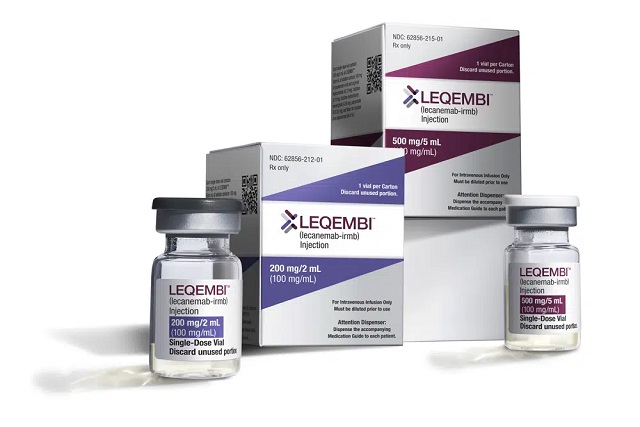Washington: The first drug to show that it slows Alzheimer’s is on sale, but treatment for most patients is still several months away. Two big factors behind the slow debut, experts say, are scant insurance coverage and a long setup time needed by many health systems. Patients who surmount those challenges will step to the head of the line for a drug that delivers an uncertain benefit. Here’s a closer look. The Situation The U.S. Food and Drug Administration approved Leqembi, from Japanese drugmaker Eisai, in early January. It’s for patients with mild or early cases of dementia tied to Alzheimer’s disease. Regulators used the FDA’s accelerated pathway, which allows drugs to launch before they’re confirmed to benefit patients. In studies, Leqembi modestly slowed the fatal disease, but doctors aren’t sure yet how that translates into things like greater independence for patients. Patients get the drug by IV every two weeks. Eisai says the company has shipped Leqembi to U.S. specialty drug distribution centers. From there, it can be delivered overnight to hospitals or medical centers. Eisai spokeswoman Libby Holman said prescriptions for the drug have been written, and they expect patients to start receiving it “very soon.” Cost and Coverage A year’s treatment will run about $26,500. Patients who can afford that without insurance will be able to start the treatment if they are deemed a candidate for Leqembi and they find a doctor and health care system prepared to help them. There are currently few options outside self-pay. Most of the patients who may be candidates for this drug are on Medicare, and the federal program’s coverage is narrow so far. It has said it will cover treatments like Leqembi only for patients enrolled in certain research trials designed to test the drug. There are no such studies currently accepting new patients. “There’s a theoretical door (to coverage) that’s completely slammed shut,” said Robert Egge, chief public policy officer for the nonprofit Alzheimer’s Association. Medicare made that coverage decision last year when another Alzheimer’s drug, Biogen’s Aduhelm, hit the market. Health insurers, which run Medicare Advantage coverage, have been sticking to that decision, said a spokesman for the trade group America’s Health Insurance Plans. The Centers for Medicare and Medicaid Services, which oversees Medicare, said after Leqembi’s approval that it may reconsider its coverage stance, something the Alzheimer’s Association has urged it to do. Coverage also is likely to change if the drug receives full approval from the FDA. That could happen later this year. In the meantime, Eisai has an assistance program that provides Leqembi for free to some patients, including those on Medicare. It’s based partly on financial need. Diagnosing It can take anywhere from several months to more than a year for doctors to diagnose a patient and then figure out if that person is a candidate for Leqembi, according to Dr. Sarah Kremen, a neurologist with the Cedars-Sinai health system in Los Angeles. That can depend on where a patient lives and the physician’s expertise. First, a doctor must determine whether a patient has mild dementia. Then the doctor has to decide what caused the condition. It could stem from Alzheimer’s, Parkinson’s disease, a stroke or a brain injury. If it’s related to Alzheimer’s disease, doctors must determine whether the patient’s brain has an amyloid protein. The new drug aims to slow the progression of Alzheimer’s by removing that protein. After all that, some doctors may hesitate to prescribe Leqembi because they don’t have a good idea yet for how the drug will help the patient or affect their everyday life, Kremen said. They have to consider that uncertainty against the brain swelling and bleeding that can develop in patients taking it. “I think this benefit versus harm issue is going to weigh heavily,” she said. Delivering treatment Health systems must first develop plans for delivering drugs like Leqembi before they start offering it. That can take months, although some may have started before regulators approved the drug. This planning might include training nurses on how to give the drug and making sure prescribing doctors know how to recognize candidates for it. Care providers also need a plan for how patients will be monitored once they start taking it. Patients need repeated brain scans to check for side effects. Doctors may want to know that such a plan is in place before they feel comfortable writing a prescription, Kremen noted. Hospital systems also will have to figure out how many patients might come to them for this drug and be able to cover all the costs tied to it. Those might include clinic, nursing, radiologist and pharmacy fees. “Frankly, the hospital systems are going to have to decide if they want to offer it,” Kremen said. “Is it worth the cost?” Eisai estimates that about 100,000 people will be diagnosed and eligible to receive Leqembi in the United States by 2026. Representatives of the drugmaker declined to estimate how many people might receive it this year. Read all the Latest News , Trending News , Cricket News , Bollywood News , India News and Entertainment News here. Follow us on Facebook, Twitter and Instagram.
Two big factors behind the slow debut, experts say, are scant insurance coverage and a long setup time needed by many health systems
Advertisement
End of Article


)

)
)
)
)
)
)
)
)



